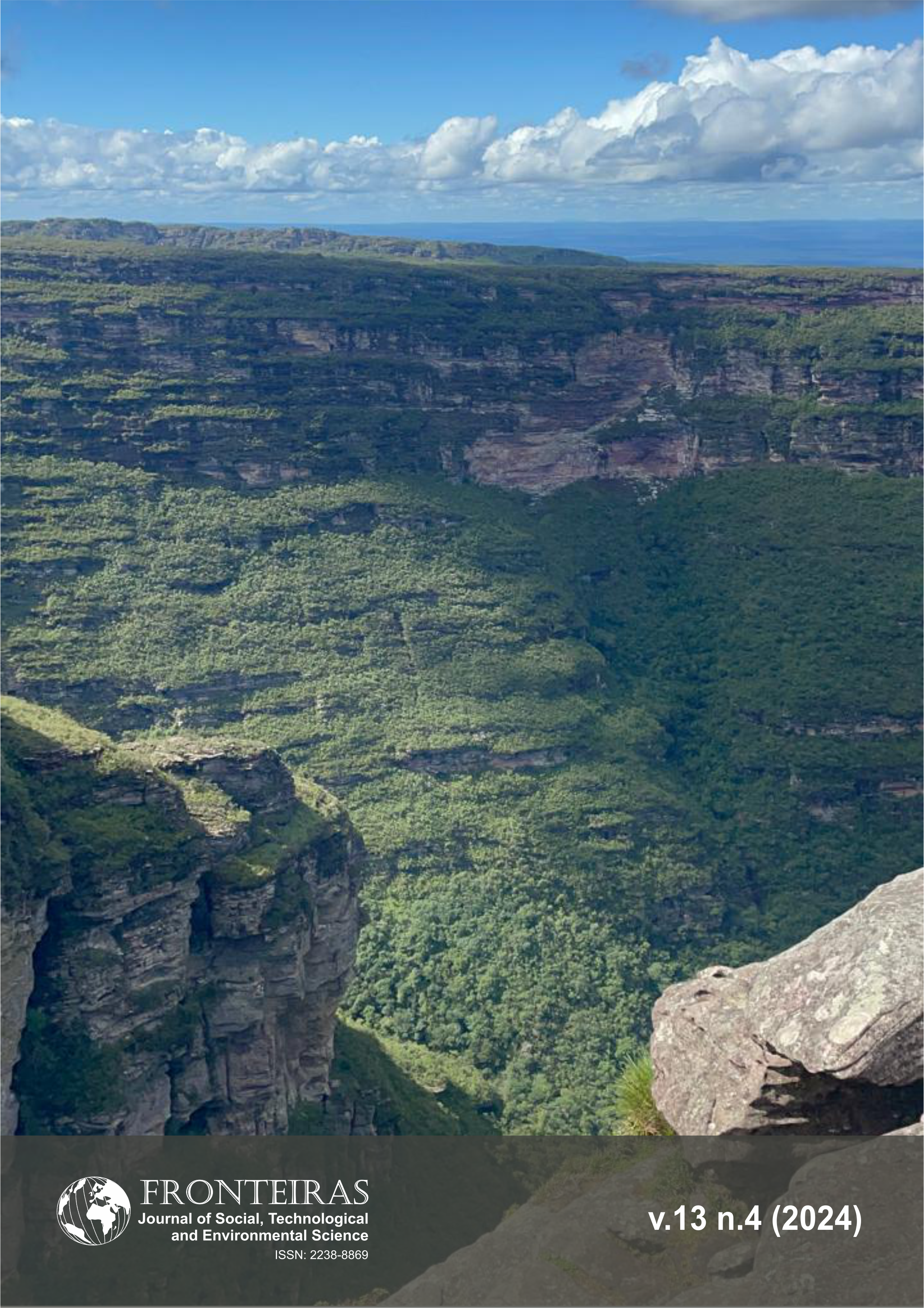The Ecological Footprint as a Tool for Analyzing the Environmental Profile of Students in the Specialization Course in Environmental Sanitary Engineering
DOI:
https://doi.org/10.21664/2238-8869.2024v13i4.p267-278Keywords:
ecological footprint, sustainability, consumptionAbstract
This paper describes the Ecological Footprint application, in the context of lato sensu postgraduate students of a sanitation and the environment course, between 2017 and 2018, from a private institution located in Belo Horizonte, Minas Gerais. Each of the 21 participating students calculated their ecological footprint and identified which habit was most interfering in the value found, discussing the results in class. The survey verified the group average (2.5 planets needed). The group's result was below the Brazilian average of 2.7, in 2007, and of some large cities in the country. The indicators that most influenced were food (39.2%) and transportation (20.2%). The importance of applying this method in the classroom was verified, particularly in an Environmental Education discipline, which allowed the awareness of the participants, as well as the indication of an important tool for the awareness of people in order to change their consumption habits.
References
Alves JED 2019. O grande crescimento da Pegada Ecológica no mundo e nos continentes. Ecodebate [31/05/2019]. Disponível em: https://www.ecodebate.com.br/2019/05/31/o-grande-crescimento-da-pegada-ecologica-no-mundo-e-nos-continentes-artigo-de-jose-eustaquio-diniz-alves-2/.
Becker M, Martins T, Campos F, Morales JC 2012. A Pegada Ecológica de São Paulo: Estado e Capital e a família de pegadas. WWF-Brasil, Brasília – DF. Disponível em: http://www.wwf.org.br/?31603/a-pegada-ecolgica-de-so-paulo--estado-e-capital.
Cerri CC, Maia SMF, Galdos MV, Cerri CEP, Feigl BJ, Bernoux, M. 2009. Brazilian greenhouse gas emissions: the importance of agriculture and livestock. Scientia Agricola 66(6):831-843. Disponível em: https://doi.org/10.1590/S0103-90162009000600017.
Cidin RCPJ, Silva RS 2004. Pegada Ecológica: Instrumento de avaliação dos impactos antrópicos no meio natural. Estudos Geográficos: Revista Eletrônica de Geografia 2(1):43-52. Disponível em: https://www.periodicos.rc.biblioteca.unesp.br/index.php/estgeo/article/view/257.
Ewing B, Moore D, Goldfinger S, Oursler A, Reed A, Wackernagel M 2010. Ecological Footprint Atlas 2010. Global Footprint Network, Oakland, California, EUA. Disponível em: https://issuu.com/globalfootprintnetwork/docs/ecological-footprint-atlas-2010.
Global Footprint Network 2024. Open data plataform. Disponível em https://data.footprintnetwork.org/#/
Gonzalez MHG, Andrade DC 2015. A sustentabilidade ecológica do consumo em Minas Gerais: uma aplicação do método da pegada ecológica. Nova Economia 25(2):421-446. Disponível em: https://revistas.face.ufmg.br/index.php/novaeconomia/article/view/2214.
Guimarães RP 1998. Aterrizando una Cometa: indicadores territoriales de sustentabilidad. CEPAL/ILPES, Santiago do Chile. Disponível em: https://www.cepal.org/es/publicaciones/7435-aterrizando-un-cometa-indicadores-territoriales-sustentabilidad.
Guimarães RP, Feichas SAQ 2009. Desafios na Construção de Indicadores de Sustentabilidade. Ambiente & Sociedade XII(2):307-323. Disponível em: https://doi.org/10.1590/S1414-753X2009000200007.
Lamim-Guedes V 2011. Pegada ecológica: consumo de recursos naturais e meio ambiente. Educação Ambiental em Ação 38. Disponível em: http://www.revistaea.org/artigo.php?idartigo=1168.
Lamim-Guedes V 2015. Pegada ecológica como recurso didático em atividades de educação ambiental on-line. Educação Unisinos 19:283-289. Disponível em: http://educa.fcc.org.br/pdf/edunisinos/v19n2/2177-6210-edunisinos-19-2-00283.pdf.
Lamim-Guedes V, Pinto LCL, Leite MG, Eskinazi-Sant'Anna EM 2012. Uma avaliação do conhecimento do conceito de Pegada ecológica em alunos dos cursos de Engenharia de Minas e Biologia da Universidade Federal de Ouro Preto (Minas Gerais, Brasil). Educação Ambiental em Ação 39. Disponível em: https://www.revistaea.org/artigo.php?idartigo=1209.
Mantovani RR, Rosa LMF 2022. Pegada Ecológica - um estudo de caso. Revista Ponto de Vista 11(1):1-14. Disponível em: https://revistapos.cruzeirodosul.edu.br/rencima/article/view/2504.
Marques R, Xavier CR 2020. Alfabetização científica no ensino de Ciências: uma sequência didática sobre a pegada ecológica do lixo. Revista de Ensino de Ciências e Matemática 11(2):84-106. Disponível em: https://revistapos.cruzeirodosul.edu.br/rencima/article/view/2504.
O'Meara M 1999. Explorando uma nova visão para as cidades. In The Worldwatch Institute. Estado do Mundo. The Worldwatch Institute, Washington, DC, p. 138-157.
ONU (Organização das Nações Unidas) 2019. População mundial deve chegar a 9,7 bilhões de pessoas em 2050, diz relatório da ONU [17.06.2019]. Disponível em: https://brasil.un.org/pt-br/83427-popula%C3%A7%C3%A3o-mundial-deve-chegar-97-bilh%C3%B5es-de-pessoas-em-2050-diz-relat%C3%B3rio-da-onu .
ONU (Organização das Nações Unidas) 2024. World Population Prospects 2024. Disponível em: https://population.un.org/wpp/Graphs/DemographicProfiles/Line/900.
Santos WA, Erthal Junior M., Barcellos RGS 2021. Biocapacidade dos biomas brasileiros a partir de conceitos da pegada ecológica emergética. Ambiente & Sociedade 24:1-24. Disponível em: https://doi.org/10.1590/1809-4422asoc20180134r2vu2021L5AO.
Sato M, Oliveira H, Zanon AM, Vargas IA, Wisiack SRC, Pereira, DM 2010. Escolas Sustentáveis e Com-Vida: Processos Formativos em Educação Ambiental. Universidade Federal de Ouro Preto, Ouro Preto. Disponível em: https://cead.ufop.br/professores/dulce/Guia%20-%20Fasciculo%20Final%20e%20Modulo%20III%20Cortado%20em%20Eixos/Escolas%20Sustent%e1veis%20e%20COM-VIDA.%20Guia%20de%20Trabalho%2025_02_2011.pdf.
Souza KR, Kerbauy, MTM 2017. Abordagem quanti-qualitativa: superação da dicotomia quantitativa-qualitativa na pesquisa em educação. Educação e Filosofia 31(61):21-44. Disponível em: http://dx.doi.org/10.14393/REVEDFIL.issn.0102-6801.v31n61a2017-p21a44.
Stiglitz JE, Sem A, Fitoussi JP 2009. Report by the Commission on the Measurement of Economic Performance and Social Progress. Eurostat, Paris. Disponível em: https://ec.europa.eu/eurostat/documents/8131721/8131772/Stiglitz-Sen-Fitoussi-Commission-report.pdf.
Teixeira MFFB 2012. Pegada Ecológica e Políticas Públicas: Estudos de caso de três cidades brasileiras. Revista Iberoamericana de Economía Ecológica 19:15-28. Disponível em: https://redibec.org/wp-content/uploads/2017/03/REV19_02.pdf.
World Wide Fund for Nature (WWF) 2002. Living Planet Report. WWF-International, Gland, Suiça. Disponível em: https://wwf.panda.org/discover/knowledge_hub/all_publications/living_planet_report_timeline/lpr_2002/.
WWF (World Wide Fund for Nature) 2016. Planeta Vivo Relatório 2016: Risco e resiliência em uma nova era. WWF-International, Gland, Suiça. Disponível em: https://wwfbrnew.awsassets.panda.org/downloads/lpr_2016_portugues_v5_otimizado.pdf.
Downloads
Published
How to Cite
Issue
Section
License
Copyright (c) 2024 Isabela Alves Dias, Valdir Lamim-Guedes, Marcos Paulo Gomes Mol

This work is licensed under a Creative Commons Attribution-NonCommercial 4.0 International License.
This journal offers immediate free access to its content, following the principle that providing free scientific knowledge to the public, we provides greater global democratization of knowledge.
As of the publication in the journal the authors have copyright and publication rights of their articles without restrictions.
The Revista Fronteiras: Journal of Social, Technological and Environmental Science follows the legal precepts of the Creative Commons - Attribution-NonCommercial-ShareAlike 4.0 International. 


